
Guests
- Setsuko Thurlowsurvivor of the atomic bombing of Hiroshima in 1945 and nuclear disarmament activist.
The G7 summit wrapped up Sunday in Hiroshima, where much of the summit focused on the war in Ukraine and China. While in Japan, President Biden and other world leaders paid tribute to the victims of the world’s first nuclear attack — the U.S. bombing of Hiroshima on August 6, 1945 — laying wreaths at the Hiroshima Peace Memorial and planting a tree. But President Biden did not issue an apology for the attack, which killed an estimated 140,000 people and seriously injured another 100,000. For more, we speak with Setsuko Thurlow, who survived the U.S. bombing of Hiroshima in 1945 and devoted her life to nuclear disarmament. In 2017, she was chosen to accept the Nobel Peace Prize on behalf of the International Campaign to Abolish Nuclear Weapons.
Transcript
AMY GOODMAN: The G7 summit wrapped up Sunday in Hiroshima, Japan. Much of the summit focused on two issues: the war in Ukraine and China. President Biden announced $375 million more in military aid for Ukraine. He also pledged to begin training Ukrainian forces on flying U.S.-made F-16 fighter jets. Biden did not offer to send any F-16s, but the U.S. has lifted its opposition to allies supplying the warplanes to Ukraine. Britain and the Netherlands have announced plans to work together to help provide Ukraine F-16s. President Biden spoke Sunday.
PRESIDENT JOE BIDEN: You know, in my private meeting with President Zelensky after the G7 meeting, and with his staff, I told — the United States, together with our allies and partners, is going to begin training Ukrainian pilots in fourth-generation fighter aircraft, including F-16s, to strengthen Ukraine’s air force as part of a long-term commitment to Ukraine’s ability to defend itself. … I have a flat assurance from the — from Zelensky that they will not — they will not use it to go on and move into Russian geographic territory. But wherever Russian troops are within Ukraine in the area, they would be able to do that.
AMY GOODMAN: Ukrainian President Volodymyr Zelensky, who attended the G7 in Hiroshima, thanked Biden for his support.
PRESIDENT VOLODYMYR ZELENSKY: We are very thankful. I think it will give us more strong positions on the battlefield. So, we are very thankful that that is a new package. I really didn’t know the details, but I know that you gave us very big package during this year. It’s more than $37 billion. My appreciations. We will never forget. Thank you.
AMY GOODMAN: While in Hiroshima, President Biden and other world leaders paid tribute to the victims of the world’s first nuclear attack — the U.S. bombing of Hiroshima on August 6, 1945 — laying wreaths at the Hiroshima Peace Memorial and planting a tree. But President Biden did not issue an apology for the attack. A group of anti-nuclear activists rallied on the streets.
PROTESTER 1: [translated] Japan and the United States are trying to conduct a war of aggression on China. I am protesting because I absolutely cannot accept the fact that they are in Hiroshima, a place where an atomic bomb was dropped, trying to hold a meeting to start a nuclear war.
PROTESTER 2: [translated] I’m absolutely against the war. I’m against using nuclear weapons. That is why I’m here. This summit is being held to prepare for a nuclear war, so we, the union, need to do whatever we can to protest against it.
AMY GOODMAN: We go now to Hiroshima, where we’re joined by Setsuko Thurlow, who survived the U.S. bombing of Hiroshima in 1945 that killed about 140,000 people. She’s devoted her life to nuclear disarmament and the ban treaty process. In 2017, she was chosen to accept the Nobel Peace Prize on behalf of the International Campaign to Abolish Nuclear Weapons, or ICAN. She’s joining us on the phone from Hiroshima.
It’s great to have you back with us, Setsuko Thurlow. If you can respond to the G7 meeting and the outcome this weekend, held in Hiroshima, where you are?
SETSUKO THURLOW: Well, I came to Hiroshima from Canada, where I live. I wanted to be part of this whole excitement that the world leaders are coming to Hiroshima and to discuss the nuclear disarmament. And the people here were so excited, so happy to have the opportunity to give them the — to give the leaders the opportunity to be with us, to be in the center of the calamity and catastrophe, and to have a profound encounter themselves with the meaning of the dawn of the nuclear age. And people had a great anticipation and excitement. They’ve prepared for this with all kinds of recommendations to the leaders.
But somehow their wishes were not fully listened. To put it bluntly, for us survivors, who want nothing less than the total disarmament, total abolishment of nuclear weapons, and the majority of the citizens of Japan who support survivors’ idea, to us, it was nothing but a disaster. We are feeling more than frustration. It’s a fury, anger and a total disappointment, because we —
AMY GOODMAN: Setsuko Thurlow, how do you think the war can end, the war in Ukraine can end?
SETSUKO THURLOW: Well, to me, personally, you know, why we keep hearing about more military aid, the support for war, than hearing about the efforts being made for a peaceful ceasefire at the earliest possible time? Every day, many, many lives have been killed. Certainly, something must be going on, some — quietly, some effort must be being paid for ceasefire. But we don’t hear about them. Are they really making that effort? Do they really feel they can win this out? I don’t know what’s their thoughts. All I can say is it has to stop at the earliest possible chance, no matter what.
AMY GOODMAN: And finally, President Biden did not apologize for the atomic bombing of Hiroshima, and then, of course —
SETSUKO THURLOW: Excuse me. I didn’t hear you. What did you say?
AMY GOODMAN: President Biden did not —
SETSUKO THURLOW: Excuse me. I didn’t hear you.
AMY GOODMAN: President Biden did not apologize for the U.S. dropping the atomic bomb on Hiroshima, then three three days later on Nagasaki. Your thoughts?
SETSUKO THURLOW: Well, it’s unfortunate. He had the opportunity, but he didn’t. This time, too, in the joint statement or communiqué, he kept criticizing the Russians, the Chinese or North Korea. And why do they fail to look at themselves with a critical eye, and we don’t hear anything evil which is being committed by the West? I mean, of course, as far as the war in Ukraine is concerned, I think Putin should get a total condemnation. I do condemn. No matter what the reason is, to be willing to kill so many human lives, that’s not acceptable. That must stop.
But your question was whether the president should have — well, my opinion, yes, the United States has committed the crime against humanity. The United States has never acknowledged any guilt. And, well, this truth, old saying, the victims — victors write the history. The U.S. has been condemning —
AMY GOODMAN: Well, Setsuko —
SETSUKO THURLOW: — the Russians’ behavior, but — yeah?
AMY GOODMAN: Setsuko Thurlow, I want to thank you —
SETSUKO THURLOW: OK.
AMY GOODMAN: — very much for being with us and speaking to us from a hospital in Hiroshima. Setsuko Thurlow, we have spoken to where she lives, in Canada, but came to Hiroshima for the G7 summit and the hibakusha, the survivors of the U.S. bombing of Hiroshima, speaking out against nuclear war during this weekend of the meeting of the G7. Setsuko Thurlow has devoted her life to nuclear disarmament and the treaty ban process. In 2017, she was chosen to receive the Nobel Peace Prize on behalf of ICAN, the International Campaign to Abolish Nuclear Weapons, together with its executive director, Beatrice Fihn. She’s worked as a social worker for decades and founded the Japanese Family Services of Metropolitan Toronto.
Next up, the NAACP issues a formal travel advisory for Florida, saying the state under Governor DeSantis has become hostile to Black Americans. Meanwhile, PEN America and Penguin Random House have sued a Florida school board for banning books. Stay with us.

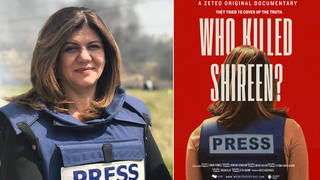
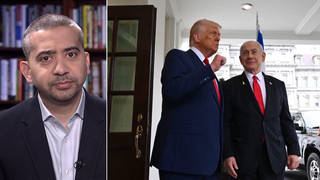
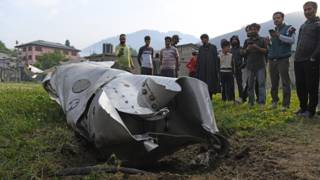
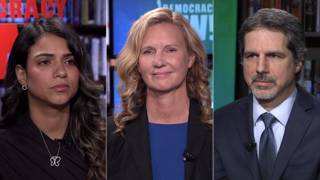





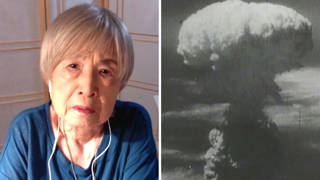

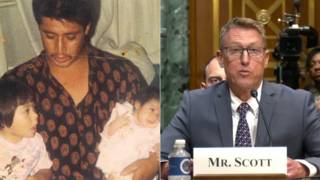
Media Options